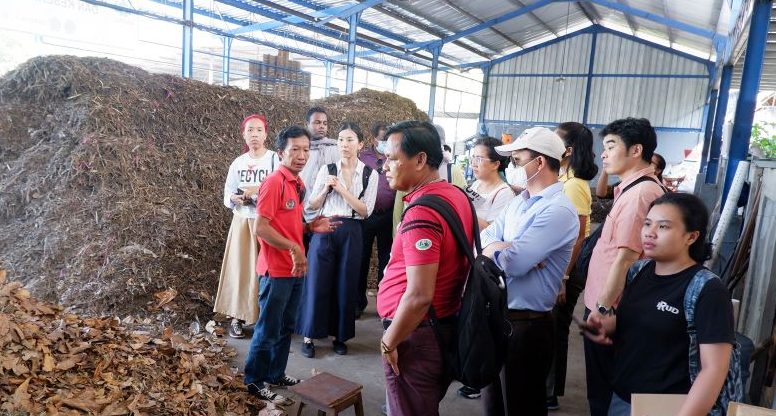Denpasar, 23 May 2023: When Sekar Tanjung Reduce-Reuse-Recycle Waste Management Facility (TPS3R) was set up in Sanur Kauh Ward in 2017, a conflict rose as many residents refused to segregate their waste, which they need to do in return of the waste collection service. These people thought it was a double burden as they had already been paying for the service fee.
‘We started visiting houses to educate people as to why they needed to segregate their waste. We distributed trash bins and showed how to do the segregation,’ said Ms Made Diatmita Puri, the administration staff of the facility during the visit by the ERIA’s Experts Working Group on Marine Plastic Debris.
The ward administration assisted the process by enforcing a regulation that obliges every household to segregate waste, and by warning that otherwise their waste will not be picked up. These efforts worked and residents have since segregated their waste accordingly.
Established by Bali Public Housing and Public Works Office, in collaboration with Sanur Kauh Ward Administration, the 2,000-square meter facility initially served only 40 households, which paid meagre Rp15,000 fee per month (about 1 USD in 2023). The facility currently provides waste collection service for 505 households in four wards, not just Sanur Kauh, as well as three hotels and one government construction project. Each household now pays monthly fee of Rp50,000 (about 3.4 USD in 2023) per month, while the hotels and government project are charged higher fee.
The waste collection is done by a fleet of seven cargo bikes, each can transport up to 700 kilograms of waste. The facility employs a total of 16 people working in two shifts from Monday to Saturday.
‘Here we only process dry waste using waste shredder and compost sieve. The wet waste is immediately transferred to local pig farms once it reached this facility to avoid the smell and complaints from neighbours,’ said Mr Sila Dharma, the TPS3R manager.

Also read: CORA Eco Ikot: Empowering Women while Mainstreaming Community-based Recycling System
Rethinking Recycling Program
The TPS3R earns their income from selling composts and recyclable items, in addition to the household service fee. Mr Sila said of the households, about 30 percent of them does not pay the monthly fee on time.
‘It is hardly a profitable operation, but we always emphasise that what we do benefit the environment,’ he said.
The facility, however, received external assistance from time to time, such as the one from McKinsey’s Delterra through Recycling Rethinking Program. The Bali-based foundation collaborated with PRAISE (Packaging and Recycling Association for Indonesia Sustainable Environment), an industry association that actively supports the holistic, integrated, and sustainable management of packaging waste in Indonesia.
In 2019, TPS3R Sekar Tanjung became the pilot for the collaboration, which aims to strengthen the waste recycling ecosystem so that it becomes an economic opportunity for the community in Sanur Kauh.
‘Together we supported households in building new recycling behaviours, optimised collection and sorting operations, integrated independent local waste collectors, and upskilled workers and community members,’ said Ms Tika Diagnestya, the Senior Associate at Delterra.

Members of ERIA Expert Working Group on Marine Plastic Debris observing the dry waste at TPS3R Sanur Kauh in Bali.
According to Ms Tika, in less than four months, the TPS3R went from losing money to being profitable and financially self-sustaining. Data by PRAISE also showed that through the program, the waste going to the landfill has been reduced by around 50 percent.
‘In 2020, we launched the Rethinking Recycling Academy in six villages in Denpasar, which are now in implementation phase and—on track to bring recycling services to 125,000 people by the end of 2022,’ she said.
Mr Sila said the facility now earns Rp6 million to Rp8 million a month (about 400-540 USD in 2023), which he said is sufficient for the operation.
‘We continue to do house visit, educating and monitoring people in regard to waste segregation,’ he said.
Today, Desa Sanur Kauh serves as a demonstration and learning site for the Rethinking Recycling Academy, an initiative designed to catalyse the transformation of waste management systems in multiple communities at once. The Sanur Kauh TPS3R has been celebrated by Indonesian ministries and heralded as the gold standard for community-driven waste management.
Also read: Operating with PPP Scheme, Integrated Waste Management Facility in Bali Turning Waste to Energy

